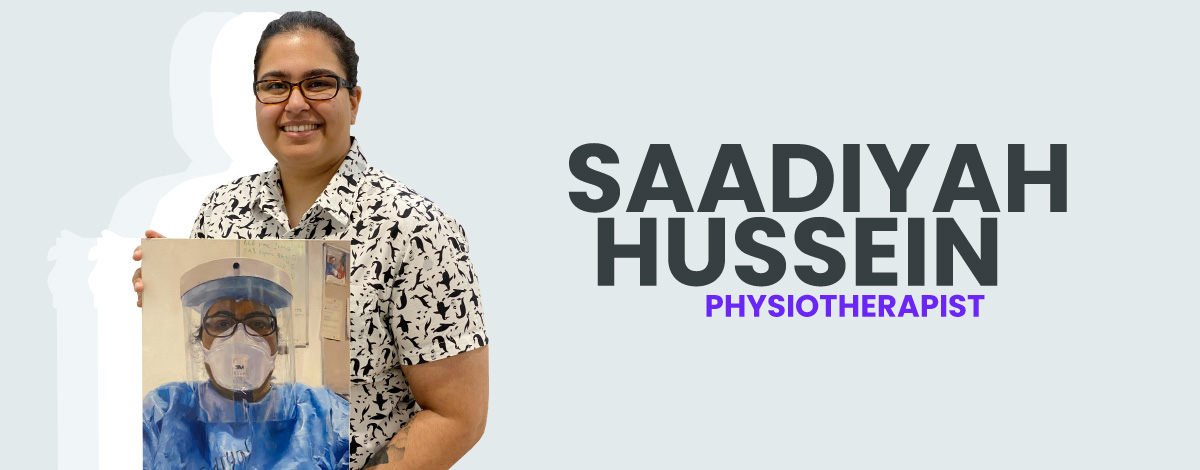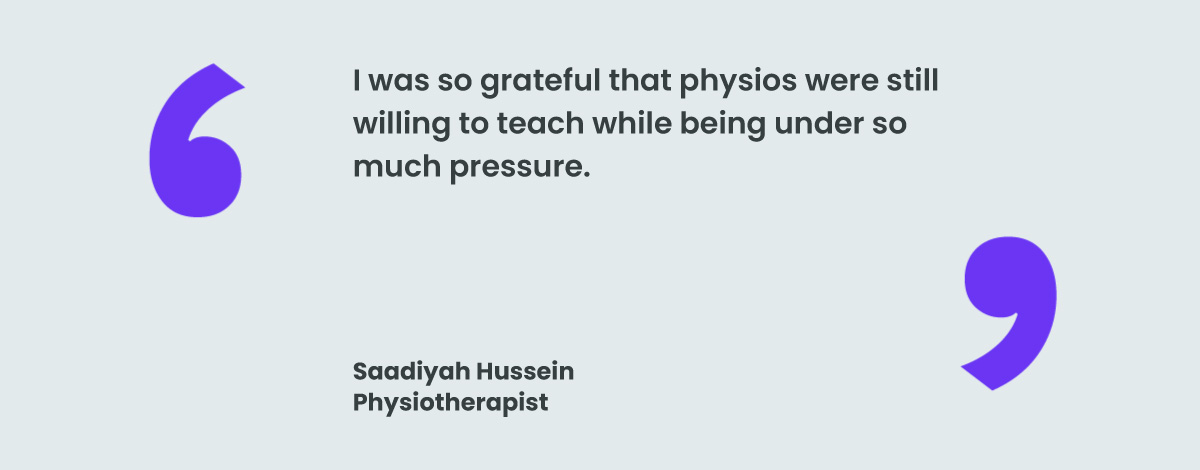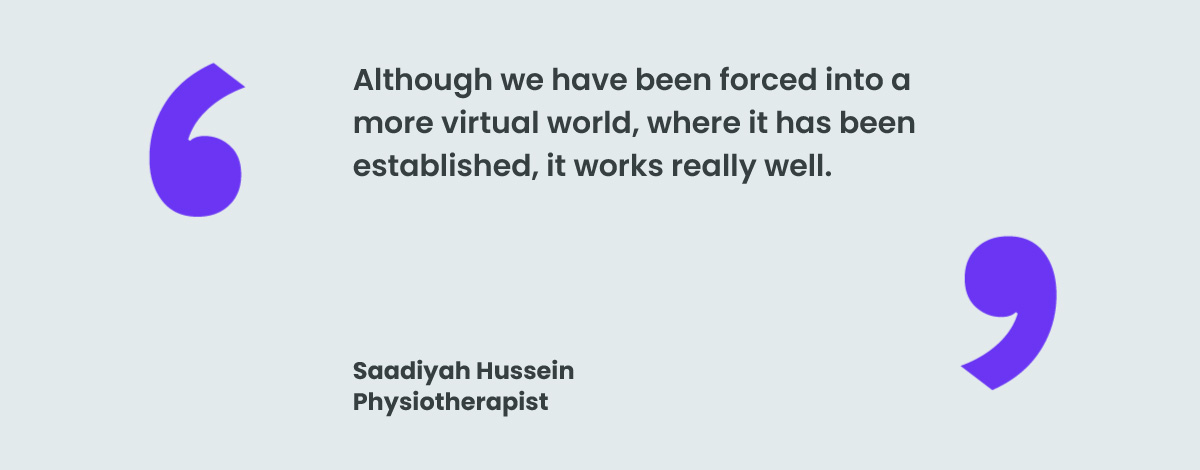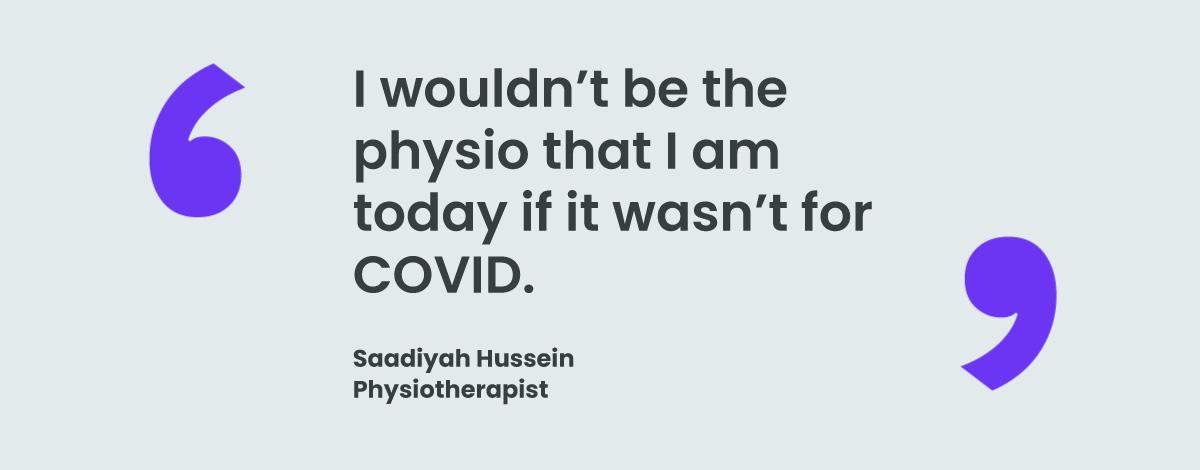Reflections with Julia: 'I wouldn’t be the physio that I am today if it wasn’t for COVID.'
23 Jul 2021Interview
In this interview, we speak with Saadiyah Hussein, a newly qualified physiotherapist currently working within inpatient community rehabilitation. Having answered a call to work as a Band 4 in the ITU in March 2020, she experienced an unprecedented final year of study.
Working full time in the first peak of the pandemic whilst also completing her dissertation and final exams, Saadiyah somehow also found time to take advantage of the wealth of extra CPD being made available online.
Here Saadiyah describes her experiences and how these have cemented her passion for the ITU and becoming a respiratory physiotherapist.

Julia: What changed for you when the pandemic hit?
Saadiyah: “I’d been on placement in the ITU at Barts, and they then offered me and my fellow placement student shifts in a Band 4 role. Accepting the work in my final year study was a bit of a crazy decision, but it’s thanks to the team I worked with that I had the confidence to qualify.
“In the month and a half that passed between me leaving the placement and returning full time, they had increased capacity from 16 ITU beds to around 30. Other wards had been converted to ITU space, with many staff redeployed to the area.
“As I was working as a non-qualified physio at that time, I was assisting in patient rehab, helping them to stand, getting their movement going and assessing their passive range after sedation. Because most patients were still sedated there wasn’t actually a lot of this to do, so we did a lot more running for the nurses.”
What was the atmosphere like?
“It was hot, sweaty and tense. I remember vividly working in one of the hottest treatment rooms on possibly the hottest day of the year, rehabbing a patient. I had sweat dripping off my forehead onto my glasses, causing them to slip off my face.
“We were in full PPE and, to begin with, it was almost impossible to find other colleagues you needed. You couldn’t see anyone’s faces and had to wait for them to turn around to see their name on their front, assuming they’d had the time to write it. Later we used photos that you could stick on your gown.
“On the respiratory side, patients weren’t presenting in the way the physiotherapists would have expected, which added to the stress. One minute they needed no respiratory support, and the next they needed it urgently. Respiratory physio is a strong area of interest for me, so there was a lot I could observe and learn, and I was so grateful that physios were still willing to teach while being under so much pressure.”

What got you through this time?
“My team. During the pandemic, they became my family.
“To protect my parents, I moved out of their home and into a flat near the hospital. I found it very difficult to come off shift from an emotionally and physically exhausting day and go back to a very quiet home, with no one to talk to about it. Mostly I was coming home, going to bed, and then going back out to work again and I actually preferred being at the hospital.
“I felt so supported by the team and they gave me so much confidence in my ability. I also tried to support people as much as I could, asking if they were OK and giving a bit of extra help and orientation advice to those who had never worked on an ITU ward before - it was very tough and traumatic for them especially.
“When I left, I gave them all bear hug pin badges as a symbol of how much they meant to me.”
How did things change for you during the second wave?
“I qualified in September and began working on rotation, so I was able to see a different aspect. I’ve been working with a different cohort of patients and continuing to learn so much.
“I’m currently working in an inpatient community rehabilitation role, working with patients either in separate rehabilitation centres or in their homes. A lot of the patients are older adults who had caught COVID and are now struggling with their recovery, despite being OK initially in some cases.
“From a rehab perspective, it’s been another learning process, and progress can be slow as patients fatigue very easily. There is new guidance coming out regularly now around this and my CPD has also helped too!
“From what I’m seeing, sending patients home as soon as possible to recover there works very well. Being surrounded by their friends and family does wonders, and the fact that we are also offering more virtual care means they have to travel less and have quicker access to advice.
“Although we have been forced into a more virtual world, where it has been established, it works really well.”

What CPD have you been accessing during this time?
“Since COVID I have accessed more CPD than in the first two years of my degree.
“There are now so many more opportunities to access learning, with so much being placed online. As a student, this is so beneficial.
“Previously I would look through the Chartered Society of Physiotherapy magazine to see what courses are available, but they were too expensive, with no subsidies for students, and often clashed with uni or placement days. Now there are so many courses that are free to attend live, or that you can pay a small fee to watch at any time. There is no travel involved so you also save so much time and expense.
“In just two examples, whilst working in the ITU, I took part in two courses put out by Brunel University - an ITU refresher and one on ITU rehab.
“Aside from formal courses, there are also different organisations and influencers such as AHP Leader putting out different content and discussion groups on Twitter and YouTube. Having such wide access makes it so much quicker for me to research something and then implement it into everyday practice.”
Do you feel that you were given enough support and information from your university to be able to gain the most from your CPD time?
“It wasn’t until this final year of my study that I realised this type of online content can count as CPD, as opposed to just recognised formal courses. In the past I wasn’t scoring highly when it came to reflecting on my learning needs, and I realise now that this was about capturing all the areas I want/need to educate myself about, with new things coming up regularly as my case load changes.
“In future, I think all students would benefit from more information around how to evidence and reflect upon their learning, as well as what counts as CPD, especially as we continue to be introduced to more virtual content.”

What are the most important lessons you’ve learned in recent months?
“I have learnt so much, not just about the profession, but about myself too. Having put a lot in place to support my mental health a few years back, this period has really tested that work. I have proven to myself that I can handle tough situations and that it’s OK to ask for support in doing that.
“I wouldn’t be the physio that I am today if it wasn’t for COVID.”
What are your hopes for the future?
“I have always wanted to become a respiratory physio and my experience with COVID has cemented that. You can make such a difference in such a quick way, and therefore get a very quick turnaround of patients.
“I’m in love with the ITU environment; there is such a strong team working with all roles having mutual respect for each other. Ultimately I want to work as an advanced critical care practitioner and will be doing a master’s degree to get there.”
A big thank you to Saadiyah for taking the time to reflect with us on her experience. If you enjoyed this article and found it a valuable insight into the life of a newly qualified physiotherapist, please share it on Twitter.
Julia helps you record, reflect, and report on your CPD through our website and app.
It's an easy way for you to stay on top of your CPD. Sign up for a 14 day free today.